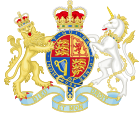- Church of Scotland Act 1921
-
Church of Scotland Act 1921 
Parliament of the United KingdomLong title An Act to declare the lawfulness of certain Articles declaratory of the Constitution of the Church of Scotland in matters spiritual prepared with the authority of the General Assembly of the Church. Statute book chapter 1921 c.29 Territorial extent Scotland Dates Royal Assent 28 July 1921 Status: Current legislation The Church of Scotland Act 1921 is an Act of the British Parliament, passed in 1921. The purpose of the Act was to settle centuries of dispute between the British Parliament and the Church of Scotland over the Church's independence in spiritual matters. The passing of the Act saw the British Parliament recognise the Church's independence in spiritual matters, by giving legal recognition to the Articles Declaratory.
Contents
Background
The Church of Scotland was founded as a Presbyterian church in 1560 during the Scottish Reformation since when it has held that the civil power had no authority over it, thus denying that it was an Established church and leading to conflicts with successive rulers from the Stuart monarchs onward. Monarchs tended to prefer the model of the Church of England, where the Crown had the power to appoint bishops, and various other forms of power over the Church (although it was not reduced to the complete state control found in Scandinavia).
The particular crisis came over the question of "lay patrons", who had the right to "present" (appoint) a minister. This was abolished in 1690 at the time of the Glorious Revolution but restored in 1712. In theory the congregation could accept or reject a candidate, but in practice this often meant little. By the late 18th century the Church was divided into the Moderate and Evangelical parties. These differed especially on the question of lay patronage, which the Evangelicals rejected. Underlying this was the split between the Calvinism of the Evangelicals and the more Enlightenment tone of the Moderates.
In 1833 the General Assembly of the Church of Scotland passed a Veto Act giving congregations the clear power of veto. However the courts generally upheld the rights of lay patrons, and thus the issue became one of Church and State. In 1843 a large part of the Church seceded as the Free Church of Scotland — not rejecting Establishment in principle, but only its present form. This secession was known as the Disruption.
In the early 20th century a reunion between the Church of Scotland and the United Free Church seemed possible. To overcome problems (including legal problems which had followed the earlier merger of the Free Church and the United Presbyterian Church) the Church of Scotland Act 1921 (11 & 12 Geo. 5 c. 29) was passed. This noted that the General Assembly had passed Declaratory Articles. These were declared to be lawful. (Thus, they were not created by parliament.) It was declared that "no limitation of the liberty, rights, and powers in matters spiritual therein set forth shall be derived from any statute or law affecting the Church of Scotland in matters spiritual at present in force; it being hereby declared that in all questions of construction the Declaratory Articles shall prevail..." (s. 1).
Current position
This has created a new and revised relationship between the Church and the State. The Church of Scotland remains the National Church, but it has complete independence in spiritual questions and appointments. After the passing of the act, a church historian proclaimed: "No Church in Christendom can so fully claim to be at once national and free as the Church of Scotland today." [1]
When legislating for Scotland since the passing of the Act, the British Parliament has to consider whether the Church of Scotland is to be excluded from the provisions. Examples included the passing of the Scotland Act 1998, which had to be worded not to infringe on the independence of the Church, and prevent the Scottish Parliament repealing the Church of Scotland Act.[verification needed] Also during the passing of the Human Rights Act 1998, an amendment was proposed when the bill was passing through the House of Lords to exclude the Church of Scotland from some of the provisions. In the end, this was not deemed necessary.
In 2005, the House of Lords finally decided the case Percy (AP) v. Church of Scotland Board of National Mission [1], ruling that, despite the 1921 Act, a ministerial appointment created a contract subject to the jurisdiction of the civil courts and employment tribunals.
References
- ^ "Church and State; who's boss?". Christians Together in the Highands and Islands. http://www.christianstogether.net/Articles/151239/Christians_Together_in/Christian_Life/Christians_and_Politics/Church_and_State.aspx. Retrieved 3 June 2011.
See also
External links
- Official text of the Church of Scotland Act 1921 as amended and in force today within the United Kingdom, from the UK Statute Law Database
- Official text of the Church of Scotland Act 1921 as originally enacted within the United Kingdom, from the UK Statute Law Database
 United Kingdom legislation
United Kingdom legislationPre-Parliamentary legislation Acts of Parliament by states preceding
the Kingdom of Great BritainActs of the Parliament of England to 1483 · 1485–1601 · 1603–1641 · Interregnum (1642–1660) · 1660–1699 · 1700–1706
Acts of the Parliament of Scotland
Acts of the Parliament of Ireland to 1700 · 1701–1800Acts of Parliament of the
Kingdom of Great Britain1707–1719 · 1720–1739 · 1740–1759 · 1760–1779 · 1780–1800
Acts of Parliament of the United Kingdom of
Great Britain and Ireland and the United
Kingdom of Great Britain and Northern IrelandChurch of England Measures Legislation of devolved institutions Acts of the Scottish Parliament
Acts and Measures of the Welsh Assembly
Acts of the Northern Ireland Assembly / of the Northern Ireland Parliament
Orders in Council for Northern IrelandSecondary legislation Categories:- History of Scotland
- Church of Scotland
- Acts of the Parliament of the United Kingdom concerning Scotland
- 1921 in law
- United Kingdom Acts of Parliament 1921
- 1921 in Scotland
- 20th-century laws in Christianity
- Church and state law
Wikimedia Foundation. 2010.

